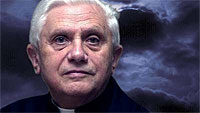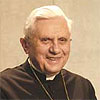 I found the photograph on the right while surfing the web -- It was hosted on a German website, although I don't know the context. I'm not sure if it's actually Cardinal Ratzinger or the Emperor from Star Wars, what with the shadow-shrouded face, dour expression and the ominous background lighting . . . but I find the photograph characteristic of some of the portrayals of the Cardinal in the press, for whom a pontificate under Cardinal Ratzinger would have the most apocolyptic overtones, spelling the doom for Jedi knights -- er, "progressive Catholics" -- across the globe.
I found the photograph on the right while surfing the web -- It was hosted on a German website, although I don't know the context. I'm not sure if it's actually Cardinal Ratzinger or the Emperor from Star Wars, what with the shadow-shrouded face, dour expression and the ominous background lighting . . . but I find the photograph characteristic of some of the portrayals of the Cardinal in the press, for whom a pontificate under Cardinal Ratzinger would have the most apocolyptic overtones, spelling the doom for Jedi knights -- er, "progressive Catholics" -- across the globe.Here's a roundup of the rather mixed reportage of Cardinal Ratzinger in recent weeks:
- Cardinal who will play kingmaker in Rome, by Stephen McGinty and Richard Gray. Scotland on Sunday April 10, 2005, reporting:
". . . this week, as either papal candidate or kingmaker, the German theologian, who was raised in Bavaria under the shadow of the Nazis, will wage a battle against the liberal forces of reform.
Yesterday the chief spokesman for the Catholic Church, Dr Joaquin Navarro-Valls, confirmed that no cardinal would speak to the press ahead of the conclave, a move understood to have been initiated by Ratzinger to prevent public debate of the issues now facing the church.
A church source said yesterday: "Cardinal Ratzinger doesn't want a pope as right wing as Pope John Paul II. He wants a Pope more right wing than Pope John Paul II. There were a lot of things which the Pope chose to do against the wishes of Cardinal Ratzinger."
Take Stephen McGinty and Richard Gray's word for it, folks. If this guy's elected, it'll be only a short time before the jack-booted Swiss Guard stormtroopers kick open the doors of every reform-minded parish to drag heterodox priests and wayward activist nuns kicking and screaming to the Inquisitor's rack.
- While tainted by the customary liberal slant of his publisher, Daniel J. Wakins' profile of the Cardinal -- Cardinal Joseph Ratzinger, the Vatican's doctrinal gatekeeper, The New York Times April 8, 2005 -- is a little less hysterical, and like John Allen Jr.'s biography The Vatican's Enforcer (Continuum, 2001), makes some effort to dispel the Dostoyevskian caricatures of Ratzinger as the "Grand Inquisitor" or Panzerkardinal:
A small, white-haired man, Ratzinger joined the pope as his doctrinal watchdog in 1981, when the pope named him leader of the Congregation for the Doctrine of the Faith, which, in more dangerous times, for accused heretics was called the Inquisition. He came to have regular access to the pope, and was often consulted by him. The two spoke in German.
In that role, he has acted as theological police officer, coming down hard on theologians who deviate from his interpretation of Catholic teaching. At least that is his public persona. But those who know him say he is a subtle thinker, a courtly and urbane man.
"He is theologically innovative but at the same time very attuned to the church and theological orthodoxy," said John-Peter Pham, a former Vatican diplomat whose book "Heirs of the Fisherman" focuses on papal transitions. Pham says that unlike virtually all of his predecessors in the last century, Ratzinger is a professional academic theologian.
He lives frugally just outside St. Peter's Square in a modest apartment over a main bus stop, and usually walks across the square to work, during which he patiently puts up with many petitioners complaining about their priest or some other issue. He is an accomplished pianist with a preference for Beethoven.
- UP Religious Affairs editor Uwe Siemon-Netto plays it safe for the most part in Analysis: Ratzinger in the ascendance (Washington Times April 2, 2005), brushing aside the usual Ratzinger stereotypes to interview Rev. Anthony Figueiredo, a former secretary of John Paul II and systematics theology teacher at Seton Hall University, on Ratzinger's strengths as a potential leader of the Church:
"At this point, doctrine is what matters. The world is in a state of flux. This is when you need consistency, and this is Ratzinger's strength. . . .
Again like John Paul II, Ratzinger considers evangelization and fidelity of faith the church's top priority, especially in the light of the growth of Islam in Europe and particularly in Italy, where it is estimated to be the predominant religion in as little as 20 years' time.
"In this situation, we need someone who is forthright in what the church teaches. We need consistency in our teaching, otherwise Muslims will not listen to us," Figueiredo insisted. "That's why Ratzinger is so important -- he will not flinch."
- In Ratzinger's mustard seed (Asia Times Online. April 5, 2005), an author by the name of Spengler revisits Ratzinger's prophetic words concerning the rise of European secularism (and consequent diminishment of Christianity) in a provocative passage from the German edition of Salt of the Earth:"We might have to part with the notion of a popular Church. It is possible that we are on the verge of a new era in the history of the Church, under circumstances very different from those we have faced in the past, when Christianity will resemble the mustard seed [Matthew 13:31-32]".
According to the author:
[Ratzinger] added, "Christianity might diminish into a barely discernable presence," because modern Europeans "do not want to bear the yoke of Christ". The Catholic Church, he added, might survive only in cysts resembling the kibbutzim of Israel. He compared these cysts to Jesus' mustard seed, faith of whose dimensions could move mountains. Ratzinger's grim forecast provoked a minor scandal, complete with coverage in Der Spiegel, Germany's leading newsmagazine. The offending sentences did not appear in the English translation, "Salt of the Earth", and were not discussed further in polite Catholic company.
George Weigel took note of Europe's spiritual crisis in a March 2005 essay "Is Europe Dying?", giving credence to Ratzinger's predictions. Spengler goes on to discuss the various manifestations of the Church throughout the world ("social-welfare agency" in the U.S.; "quasi-revolutionary political movement" in Latin America) and sees John Paul II and Cardinal Ratzinger as part of the "'Augustinian' minority of senior clergy who tried to steer the Church back to its fundamental mission, namely repentance and salvation."
- Shortly before the passing of our Holy Father, Sandro Magister offered a portrait of Cardinals Ratzinger and Ruini and their service to the Pope in the latter days of his life (The Pope and His Two Consuls, by Sandro Magister. www.Chiesa. March 30, 2005):
The pope's esteem for Ratzinger and Ruini goes beyond his entrusting them with the two ceremonies dearest to him, Palm Sunday and the Stations of the Cross. He has also seen them, from the beginning, as the two sharpest minds among the Church's leadership. He has always placed enormous trust in their analyses and decisions, and he keeps this trust alive.
And the latest news is that both Ratzinger and Ruini have increased rather than diminished the impact and intensity of their public activity. While the pope declines and remains silent, they are speaking and acting more than ever. And the tenor of their speech and activity is geared far more toward the future than toward the past. It's almost like they are revealing a plan for the next pontificate. Their recent declarations have already become required reading for the main electors of the future pope. . . .
In Ratzinger's case, the latest of these key declarations is the text he wrote for the Stations of the Cross at the Colosseum.
The very fact that the pope entrusted the composition of these meditations to him is news in itself – in recent years, this task had been assigned more modestly to poets, monks, and journalists. But it is no less surprising that three days before the ceremony, Ratzinger's text was made available in various languages on the Vatican's website, and was immediately taken up and discussed all over the world. It is impossible not to come to the conclusion that John Paul II authorized this unusual early release of the text.
- If Sandro is right, perhaps there's something to all this talk about Ratzinger being papabile after all. At the same time, I'd prefer not to indulge too much in such speculation, given the press appears to be doing a fine job of it already:
Ratzinger possible successor to Pope John Paul Expatica.com [Germany] April 7, 2005.
Ratzinger ruled out as likely successor The Australian April 8, 2005.
Well, that was quick.
- Finally, we learn from Reuters that Ratzinger made Time Magazine's "100 Most Influential" List. Subscription required to view the actual article, which I don't have (anybody care to email?)

I'll leave you with a better photograph of the Cardinal we all know and love, this one courtesy of the June 2003 issue of 30 Giorni, featuring Ratzinger's speech to the Pontifical Biblical Commission on the hundredth anniversary of its constitution.
And for the pessimists among us, a parting reflection from the Cardinal himself:
The loss of joy does not make the world better -- and, conversely, refusing joy for the sake of suffering does not help those who suffer. The contrary is true. The world needs people who discover the good, who rejoice in it and thereby derive the courage and impetus to do good.We have a new need for that primordial trust which ultimately faith can give. That the world is basically good, that God is there and is good. That it is good to live and be a human being. This results, then, in the courage to rejoice, which in turn becomes commitment to making sure that other people, too, can rejoice and recieve good news.
Cardinal Ratzinger, Salt of the Earth, pp. 36-37.


No comments:
Post a Comment